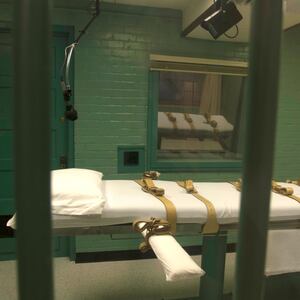Democrats running for president in 2020 are rushing to cheer Governor Gavin Newsom, after the recently inaugurated California Democrat signed an executive order to halt further executions in his state.
The first two candidates to make public statements on Newsom’s order were California’s own Sen. Kamala Harris (D-CA) and Sen. Cory Booker (D-NJ), both of whom have focused their campaigns in part on criminal justice reform and the country’s incarceration of people of color.
But those senators were far from alone in endorsing the order or condemning capital punishment writ large.
Senator Bernie Sanders (I-VT) celebrated the news and once again called for the abolition of the death penalty. An aide to Sen. Elizabeth Warren (D-MA) told The Daily Beast that she supported the order too, and reaffirmed her position against capital punishment which notably came up when she opposed the death penalty for Boston Marathon bomber Dzhokhar Tsarnaev. Marie Logsden, a senior adviser to former Colorado Governor John Hickenlooper’s campaign, said he opposes the death penalty and has written about it in a prior memoir. And Glen Caplin, a top aide to Sen. Kirsten Gillibrand (D-NY) told The Daily Beast that the senator “fully supports Governor Newsom's executive order.” Caplin confirmed that as a matter of principle "she is against the death penalty” too.
“Now you can be against the death penalty by embracing what I would describe as embracing mainstream American values,” Austin D. Sarat, a professor of law and jurisprudence at Amherst College told The Daily Beast. “You’re against executing the innocent. You’re against sentencing people based on the race of the victim. I think it’s now just must safer for politicians to take stands against the death penalty.”
The comments from Democrats on Newsom’s order reflected what appears to be a general opposition to the death penalty that is shared by much of the current Democratic field, including Washington’s Democratic Governor Jay Inslee, who announced in 2014 that no executions would take place in the state while he was governor, and former Rep. Beto O’Rourke (D-TX), who has said he opposes capital punishment.
There is little public record of Sen. Amy Klobuchar’s (D-MN) past positions on the death penalty, and her office did not return a request for comment on the matter.
But there is one likely candidate who has previously taken a different path. As a U.S. senator, Joe Biden helped write the 1994 crime bill that expanded the application of the death penalty, saying at one point that “we have predators on our streets” who are “beyond the pale.” Sanders voted for it too, though he framed it as a compromise measure.
After one Republican had complained that an earlier crime bill coddled criminals, Biden replied, in support of the law, that "we do everything but hang people for jaywalking." A request for comment made to Biden’s spokesperson was not returned.
Newsom’s order, and the chorus of 2020 candidates jockeying to endorse it, signifies a steady shift in national politics around the theory of capital punishment. It was just over 30 years ago when the conventional wisdom took firm hold that Democratic presidential nominee Michael Dukakis made himself a political cautionary tale when he gave a cool and impersonal answer to the question of how he’d feel about the death penalty for a hypothetical perpetrator who’d raped and murdered his wife.
Just four years later, when Bill Clinton was running for his party’s nomination, he left the campaign trail to be present for an execution in Arkansas, a move that was meant to serve as a showcase of his tough-on-crime stance.
Even during the 2016 cycle, the politics of the death penalty were muddled. After the Department of Justice, under President Barack Obama, announced that it would be pursuing the death penalty for Dylann Roof, the shooter of nine parishioners at a historically black church in Charleston, Sanders said he opposed such a move while Hillary Clinton supported it.
But the politics have clearly changed with respect to capital punishment. Former Attorney General Eric Holder came out in support of a moratorium on the practice as a number of states, including Connecticut, Maryland, New Jersey and New Mexico have abolished capital punishment.
“The politics of the death penalty have changed for several reasons,” Jeff Kirchmeier, a criminal law professor at the City University of New York School of Law told The Daily Beast. “They include discoveries of wrongful convictions and new understandings about the way the death penalty is applied arbitrarily and in a racially discriminatory manner.”
Republicans, too, have begun to sour on the death penalty as a tool of criminal justice. In several conservative-leaning states, there has been movement for the abolition of capital punishment. But at the top of the party is a president who proudly embraces the concept.
Donald Trump has talked openly about executing drug dealers as a means of alleviating the opioid crisis. And he infamously called for the death penalty for the wrongly convicted Central Park Five, who were accused of brutally assaulting and raping a jogger in New York City. On Wednesday morning, the president chimed in on Newsom’s order as well, with a far different take than the Democrats hoping to unseat him.








